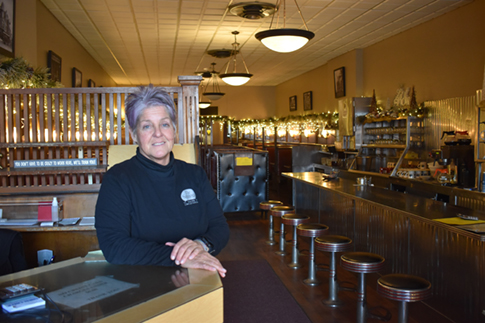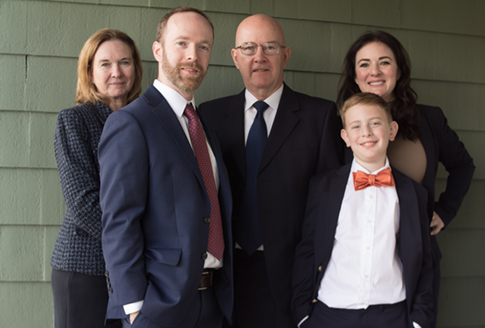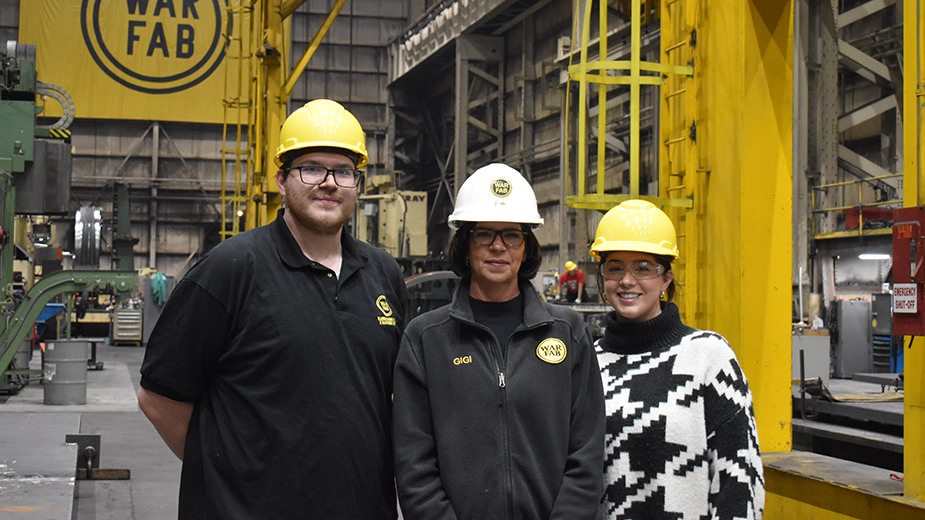YOUNGSTOWN, Ohio – Eric Rebhan and Regina Rebhan Mitchell had been working for their father, John, at his companies for several years. But his death in 2008, at age 64, was nonetheless a challenge for the business.
It put the siblings in the unexpected role of taking over both Warren Fabricating and a sister company, Ohio Steel Sheet and Plate, that their father had launched in 1985.
“We did not have the benefit of a planned succession. None of us thought he would be gone as early as he was,” says Mitchell, who is CEO of Warren Fabricating, while her brother now heads Ohio Steel. “I was 38 years old when my father died. Eric was 39. We were very young to take on this amount of responsibility.”
Successions, whether planned or unexpected, represent challenges for businesses, according to area business owners who have undertaken them and attorneys who advise them.
Often a sticking point in succession planning for a matriarch or patriarch running a business is when the eldest of the children is not necessarily the most capable, says attorney Nils Johnson of the law firm Johnson & Johnson of Canfield. The most capable individual might be the youngest member of the family rather than the oldest, or the daughter instead of the son.
There are other problematic scenarios. For example, say the founder of a business has an entrepreneurial bent but lacks the administrative skills to take the business to the next level, but the younger person has new ideas or wants to expand the business in ways that the owner is uncomfortable with.
Inheritance can also complicate matters.
“Sometimes in a family business turnover, there are certain family members that do a lot of work and there are certain family members that have other pursuits,” says attorney Molly Johnson of Johnson & Johnson. “If only certain children or grandchildren are involved in the family business, how does that comingle with any expectancy for inheritance?”
The situation can be further muddled when family members in the line of inheritance and succession live far away and don’t have the opportunity to participate in the family business. “So, are you going to have them inherit shares in that family business even though they’re not here? It’s a complicated question, and the intermix with estate planning can be difficult,” Johnson says.
WARREN FABRICATING
The company founded in 1967 by John C. Rebhan and William Marsteller later became known as Warren Fabricating & Machining Corp. after Rebhan bought his partner’s interest. Warren Fab is in its second generation of family ownership. Eric Rebhan joined the company right out of high school in 1988 while his sister, Mitchell, joined the business after graduating from college in 1993.
The siblings had been involved in the family enterprises more than 20 years when their father’s death left them in charge, and their father had involved them in every aspect of the industry, Mitchell says.
Her father also had no hesitation about involving his daughter in the business at a time when few women were involved in manufacturing, she says. For many years, she was “the only woman in the room” at customer and client events.
“He was always inclusive of both of us, my brother and myself. And I never felt that he thought because I’m a woman I won’t be able to run this company at some point,” she says. “That was always encouraging.”
A challenge the second-generation owners faced was finding ways to keep the company relevant, not only by investing in new technology but pivoting to new sectors.
But the biggest challenge the siblings faced was convincing their customer base and various partners, including banks, vendors and the mills they dealt with, that they “had the ability and the fortitude to carry on the business” – a message they also had to convey to employees.
“It would have been very easy to have a large exodus of employees right after our father’s death,” Mitchell says. She credits her involvement and her brother’s with averting adverse outcomes.
Saratoga Restaurant
The Saratoga Restaurant in downtown Warren is in its third generation of ownership by the Economos family. Opened in 1916, brothers Harry and Nick Economos acquired the restaurant in 1935, and Nick’s son, Jim, joined his father and uncle in managing the restaurant in 1960.

Siblings Chrisi and Eric Economos became partners with their father, Jim, in 1988 and took over the landmark after his death in 2015. “Just carrying on the tradition,” Chrisi Economos says.
Her father and grandfather were “wonderful teachers,” she reflects. She runs the front end of the restaurant while her brother manages the kitchen.
Economos acknowledges there has been little change in how the restaurant has operated since she and her brother took over from her father. “It was literally his way, but it worked,” she says.
KOMARA JEWELERS
Bob Komara worked in his father’s jewelry store in Struthers for several years before opening his own, Komara Jewelers in Canfield. As a youth, he would sweep the dirt and soot on the floor and counters from the steel mills that came in every time the shop’s door was opened.

His daughter, Brianna Komara Pridon, remembers working at her father’s store years before she joined the business full time.
“I would come in every Saturday. My favorite thing was to vacuum and to wash the counters,” she recalls. She worked at the store through high school. As she studied business when she was away at college, she “fell more in love with it.”
Pridon and her brother, Rob Komara, took over operation of Canfield-based Komara Jewelers from their father in 2018. He has been gradually giving them shares of the business over the years to prevent putting a “financial strain” on the business. He has seen other instances where owners had their children buy a business and then kill it.
“When you have a family business, it’s always a dream or a desire for one of your kids to get involved,” Bob Komara muses. His oldest daughter wasn’t interested, but Brianna was. So after graduating from college, she went to Gemological Institute of America to become a certified gemologist.
Not long after she started at the institute, her brother joined her there to earn degrees in jewelry repair and diamonds, he says. Though he has stepped down from day-to-day management of the store, he works at the store when he is in town.
“A lot has changed. We rely so much more on the computer now,” says Pridon, who over the past decade has become the store’s main buyer. “As soon as we sell an item, we replenish it, refill it, so I’m always looking at the hottest trends and stocking those.”
One of the main areas where the senior Komara had a more prominent role in the past was advertising and marketing, Rob Komara says. What they do now hasn’t changed significantly. But the store is advertising differently than before – “because before there wasn’t social media,” he says.
“I’m as old school as you can get, and I did everything by the seat of my pants, and I was smart enough and aware enough of everything that I was able to get by,” Bob Komara says. This year, the store shot its holiday season television ads in August, where in past years the spots would be filmed the week before Christmas.
There was never any question that the siblings couldn’t make the business work together, Rob Komara says.
“Over the years, we’ve come to understand our roles better, and our weaknesses and our strengths,” Pridon says.
PERSONAL EXPERIENCE
Attorney Nils Johnson not only deals with business successions but recently went through one with his firm, Johnson & Johnson, which his grandfather launched a century ago.
“We had a plan five years ago that I wanted to get the firm over the 100-year mark,” he recalls.

After that, Johnson wanted to continue working as a lawyer but no longer wanted to be responsible for running the firm and dealing with issues such as advertising, hiring and “how many hours of legal education we have,” he says. He had open discussions with his son, Peter, and daughter, Molly.
“And then we just did it,” he says.
Where people get in trouble is when the owner is not transparent and “keeps the cards close to his vest,” and there isn’t an honest assessment of skill sets and shortcomings.
“My brother is more of a dollars-and-cents guy. He enjoys the business/operational side of things,” Molly Johnson says, while she is “happy to put [her] head down” and be the firm’s rainmaker, meeting with and attracting new clients. She and her brother share human resources responsibilities.
She acknowledges she has had “some difficult but productive and supportive discussions” with her father and brother about her own potential transition out of the firm. She currently serves as the judge of Mahoning County’s Canfield court, and has expressed interest in pursuing a full-time judgeship.
THE NEXT GENERATION
The groundwork is being laid for the next generation of ownership at Warren Fabricating. While her brother doesn’t have any children, two of Mitchell’s three adult children – Alec and Bailey Pontikos – are directly involved with the business.
“I’ve done very much the same thing our father did,” bring them in on the ground floor, Mitchell says. Her son, now a quality control inspector, has run the Crain and a burning table, and her daughter has been cross-trained in multiple areas of the business and now is in document control, part of the quality control system.
Being exposed to multiple aspects of the business allowed Mitchell and her brother, when their time came, to be informed and confident in their decision-making.
When the second or third generation is coming into a business, those individuals need to learn
every aspect of the company, Alex Pontikos says. He started “from the ground up,” sweeping floors and taking inventory. “I find that very pivotal,” he says.
“We’re being introduced to each aspect of the company, which is nice, and just absorbing as much information as we can,” Bailey Pontikos says.
Alex Pontikos says he and his sister have visited the plant since they were young but never felt like they had an obligation to work for Warren Fabricating. “It never felt like we were being forced into the position of working here at all. We had other avenues,” he says.
His sister, who had been interested in working at the company or launching one of her own, says she interned there after she returned home from college.
“It just developed into loving being here,” she says.
WHAT THE FUTURE HOLDS
Though there is no immediate need for succession at the Saratoga – its owners are middle age – the restaurant’s future beyond them is uncertain. Chrissi has no children. Her brother has a daughter who is age 13, and her sister’s son and daughter have no interest in the business.
Mitchell has seen local competitors get sold to venture capital groups, for example, but has never seen the transition be successful. She is confident about Warren Fabricating’s third-generation leadership and predicts the company “will be here at the 75-year mark” because of her children’s “genuine interest” in the company.
“You have to be invested,” she says. “You have to be interested and you have to love what you’re doing, because there are easy days and there are really hard days in any business. You’ve got to be committed.”
Molly Johnson says her brother’s children are age 2 and 3, but her son, Remy, is 11. She will support his decision to go into law if that’s what he elects to do but isn’t encouraging it.
“My hope for him is that he takes a different career,” she says. “I don’t want him to be beholden to it.”
Remy would be a fifth-generation lawyer, and when there are that many lawyers in a family, there is a lot of pressure, she says.
At Komara Jewelers, the next generation is lining up to succeed the current owners. Pridon says her daughter recently wrote about how she wants to work with her mother and cousin at the store.
“It’s in their sights,” Rob Komara says.
Pictured at top: From left are Alec Pontikos, Regina Rebhan Mitchell, CEO of Warren Fabricating, and Bailey Pontikos.
